| Listing 1 - 10 of 11 | << page >> |
Sort by
|
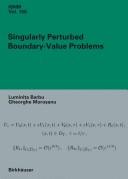
ISSN: 05390141 ISBN: 1281140252 9786611140250 3764383313 3764383305 9783764383305 9783764383312 Year: 2007 Volume: 156 Publisher: Basel: Birkhäuser,
Abstract | Keywords | Export | Availability | Bookmark
 Loading...
Loading...Choose an application
- Reference Manager
- EndNote
- RefWorks (Direct export to RefWorks)
This book offers a detailed asymptotic analysis of some important classes of singularly perturbed boundary value problems which are mathematical models for various phenomena in biology, chemistry, and engineering. The authors are particularly interested in nonlinear problems, which have hardly been examined so far in the literature dedicated to singular perturbations. This book proposes to fill in this gap, since most applications are described by nonlinear models. Their asymptotic analysis is very interesting, but requires special methods and tools. The treatment presented in this volume comb
Boundary value problems --- Nonlinear boundary value problems. --- Singular perturbations (Mathematics) --- Asymptotic theory. --- Differential equations --- Perturbation (Mathematics) --- Asymptotic theory of boundary value problems --- Differential equations, Nonlinear --- Asymptotic theory --- Differential equations, partial. --- Partial Differential Equations. --- Partial differential equations --- Nonlinear boundary value problems --- Partial differential equations. --- Boundary value problems - Asymptotic theory
Book
ISBN: 9783642122453 9783642122446 Year: 2010 Publisher: Berlin Heidelberg Springer Berlin Heidelberg
Abstract | Keywords | Export | Availability | Bookmark
 Loading...
Loading...Choose an application
- Reference Manager
- EndNote
- RefWorks (Direct export to RefWorks)
This monograph covers higher order linear and nonlinear elliptic boundary value problems in bounded domains, mainly with the biharmonic or poly-harmonic operator as leading principal part. Underlying models and, in particular, the role of different boundary conditions are explained in detail. As for linear problems, after a brief summary of the existence theory and Lp and Schauder estimates, the focus is on positivity or - since, in contrast to second order equations, a general form of a comparison principle does not exist - on near positivity. The required kernel estimates are also presented in detail. As for nonlinear problems, several techniques well-known from second order equations cannot be utilized and have to be replaced by new and different methods. Subcritical, critical and supercritical nonlinearities are discussed and various existence and nonexistence results are proved. The interplay with the positivity topic from the ïrst part is emphasized and, moreover, a far-reaching Gidas-Ni-Nirenberg-type symmetry result is included. Finally, some recent progress on the Dirichlet problem for Willmore surfaces under symmetry assumptions is discussed.
Book
ISBN: 9780387096063 9780387096056 Year: 2009 Volume: v. 3 Publisher: New York NY Springer New York
Abstract | Keywords | Export | Availability | Bookmark
 Loading...
Loading...Choose an application
- Reference Manager
- EndNote
- RefWorks (Direct export to RefWorks)
We visualise developmental biology as the study ofprogressive changes that occurwithin cells, tissues and organisms themselves during their life span. A good exampleofa field ofdevelopmentalbiology in whichthis conceptis encapsulatedis thatofsomitogenesis. The somitewas identifiedas the primordialunit underlyingthe segmentedorganisationofvertebrates more than two centuries ago. The spectacular discoveries and achievements inmolecularbiologyin the last fifty years have created a gene-basedrevolution in both the sorts ofquestions as well as the approaches one can use in developmental biology today. Largely as a resultofthis, during the 20th and 21st centuries this simple structure, the somite, has been the focus ofa deluge ofpapers addressingmultipleaspectsofsomiteformation and patterning both at the cellularand molecular level. One ofthe mainreasons for suchinterest in the process ofsomitogenesis stems from the fact that it is such an exquisitelybeautiful example ofbiology working under strict temporal and spatial control in a reiterative manner that is highly conserved across the vertebrate classes. Our intention is that this book will be ofinterest to different kinds ofscientists, includingbasic researchers, pathologists, anatomists, teachersandstudentsworking in the fields ofcell and developmentalbiology. The nine chapterscoverawide array of topics that endeavour to capture the spirit of this dynamic and ever-expanding disciplineby integratingboth contemporaryresearchwith the classical embryological literaturethat concentratedon descriptionsofmorphologicalchanges inembryos and the interactionsofcells and tissues during development. Inso doingthey encompass the main aspects ofsomitogenesis across four vertebrate classes (frog, fish, mouse and chick) and the hope is that this will enable readers to acquire an appreciationof this developmentalprocess in all its facets.
biochemie --- Human biochemistry --- medische biochemie --- Diffraction --- Boundary value problems --- Problèmes aux limites --- EPUB-LIV-FT LIVBIOLO LIVBIOMO LIVMEDEC SPRINGER-B
Book
ISBN: 9783642006050 9783642006043 Year: 2009 Publisher: Berlin Heidelberg Springer Berlin Heidelberg
Abstract | Keywords | Export | Availability | Bookmark
 Loading...
Loading...Choose an application
- Reference Manager
- EndNote
- RefWorks (Direct export to RefWorks)
These Proceedings contain a selection of the lectures given at the conference BAIL 2008: Boundary and Interior Layers - Computational and Asymptotic Methods, which was held from 28th July to 1st August 2008 at the University of Limerick, Ireland. The ?rst three BAIL conferences (1980, 1982, 1984) were organised by Professor John Miller in Trinity College Dublin, Ireland. The next seven were held in Novosibirsk (1986), Shanghai (1988), Colorado (1992), Beijing (1994), Perth (2002),Toulouse(2004),and Got ¨ tingen(2006).With BAIL 2008the series returned to Ireland. BAIL 2010 is planned for Zaragoza. The BAIL conferences strive to bring together mathematicians and engineers whose research involves layer phenomena,as these two groups often pursue largely independent paths. BAIL 2008, at which both communities were well represented, succeeded in this regard. The lectures given were evenly divided between app- cations and theory, exposing all conference participants to a broad spectrum of research into problems exhibiting solutions with layers. The Proceedings give a good overview of current research into the theory, app- cation and solution (by both numerical and asymptotic methods) of problems that involve boundaryand interior layers. In addition to invited and contributed lectures, the conference included four mini-symposia devoted to stabilized ?nite element methods, asymptotic scaling of wall-bounded ?ows, systems of singularly p- turbed differential equations, and problems with industrial applications (supported by MACSI, the Mathematics Applications Consortium for Science and Industry). These titles exemplify the mix of interests among the participants.
Numerical analysis --- analyse (wiskunde) --- Computer. Automation --- informatica --- numerieke analyse --- Engineering sciences. Technology --- ingenieurswetenschappen --- wiskunde --- Boundary layer --- Boundary value problems --- Boundary conditions (Differential equations) --- Differential equations --- Functions of complex variables --- Mathematical physics --- Initial value problems --- Asymptotic theory
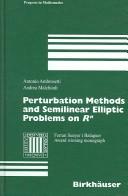
ISBN: 1280608854 9786610608850 3764373962 3764373210 9783764373214 9783764373962 Year: 2006 Volume: 240 Publisher: Basel: Birkhäuser,
Abstract | Keywords | Export | Availability | Bookmark
 Loading...
Loading...Choose an application
- Reference Manager
- EndNote
- RefWorks (Direct export to RefWorks)
The aim of this monograph is to discuss several elliptic problems on Rn with two main features: they are variational and perturbative in nature, and standard tools of nonlinear analysis based on compactness arguments cannot be used in general. For these problems, a more specific approach that takes advantage of such a perturbative setting seems to be the most appropriate. The first part of the book is devoted to these abstract tools, which provide a unified frame for several applications, often considered different in nature. Such applications are discussed in the second part, and include semilinear elliptic problems on Rn, bifurcation from the essential spectrum, the prescribed scalar curvature problem, nonlinear Schrödinger equations, and singularly perturbed elliptic problems in domains. These topics are presented in a systematic and unified way.
Differential equations, Elliptic. --- Perturbation (Mathematics) --- Boundary value problems. --- Boundary conditions (Differential equations) --- Differential equations --- Functions of complex variables --- Mathematical physics --- Initial value problems --- Perturbation equations --- Perturbation theory --- Approximation theory --- Dynamics --- Functional analysis --- Elliptic differential equations --- Elliptic partial differential equations --- Linear elliptic differential equations --- Differential equations, Linear --- Differential equations, Partial --- Numerical analysis. --- Differential equations, partial. --- Functional analysis. --- Numerical Analysis. --- Partial Differential Equations. --- Functional Analysis. --- Functional calculus --- Calculus of variations --- Functional equations --- Integral equations --- Partial differential equations --- Mathematical analysis --- Differential equations, Elliptic --- Partial differential equations.
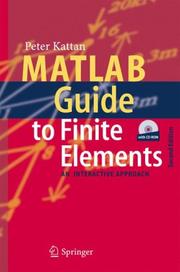
ISBN: 9783540706977 9783540706984 3540706976 9786612824142 3540706984 1282824147 Year: 2008 Publisher: Berlin ; New York : Springer,
Abstract | Keywords | Export | Availability | Bookmark
 Loading...
Loading...Choose an application
- Reference Manager
- EndNote
- RefWorks (Direct export to RefWorks)
This successful textbook explores the numerical implementation of Finite Element Analysis using the computer program MATLAB, which is very popular today in engineering and engineering education. The book contains a short tutorial on MATLAB as well as a systematic strategy for the treatment of finite element methods. Useful to both students and researchers in engineering, it provides various examples and exercises from mechanical, civil and aerospace engineering, as well as from materials science. The book especially stresses the interactive use of MATLAB, with each example solved in an interactive manner. An extensive solutions manual is provided as well, which includes detailed solutions to all the problems in the book for classroom use. This second edition includes a new brick (solid) element with eight nodes and a one-dimensional fluid flow element. A review of the applications of finite elements in various fields such as fluid flow, heat transfer, structural dynamics, electro-magnetics, is added as well.
Finite element method --- 519.62 --- 519.63 --- 681.3*G17 --- 681.3*G18 --- 681.3 *G18 Partial differential equations: difference methods elliptic equations finite element methods hyperbolic equations method of lines parabolic equations (Numerical analysis) --- Partial differential equations: difference methods elliptic equations finite element methods hyperbolic equations method of lines parabolic equations (Numerical analysis) --- 681.3*G17 Ordinary differential equations: boundary value problems convergence and stability error analysis initial value problems multistep methods single step methods stiff equations (Numerical analysis) --- Ordinary differential equations: boundary value problems convergence and stability error analysis initial value problems multistep methods single step methods stiff equations (Numerical analysis) --- 519.63 Numerical methods for solution of partial differential equations --- Numerical methods for solution of partial differential equations --- 519.62 Numerical methods for solution of ordinary differential equations --- Numerical methods for solution of ordinary differential equations --- Data processing. --- MATLAB. --- MATLAB (Computer program) --- Matrix laboratory --- Computational Intelligence. --- Mathematical Software. --- Numerical Analysis. --- Finite element method -- Data processing. --- Engineering. --- Computer software. --- Numerical analysis. --- Mechanics. --- Computational intelligence. --- Continuum mechanics. --- Continuum Mechanics and Mechanics of Materials. --- 681.3 *G18 Partial differential equations: difference methods; elliptic equations; finite element methods; hyperbolic equations; method of lines; parabolic equations (Numerical analysis) --- Partial differential equations: difference methods; elliptic equations; finite element methods; hyperbolic equations; method of lines; parabolic equations (Numerical analysis) --- 681.3*G17 Ordinary differential equations: boundary value problems; convergence and stability; error analysis; initial value problems; multistep methods; single step methods; stiff equations (Numerical analysis) --- Ordinary differential equations: boundary value problems; convergence and stability; error analysis; initial value problems; multistep methods; single step methods; stiff equations (Numerical analysis) --- Data processing --- Mechanics of continua --- Elasticity --- Mechanics, Analytic --- Field theory (Physics) --- Intelligence, Computational --- Artificial intelligence --- Soft computing --- Classical mechanics --- Newtonian mechanics --- Physics --- Dynamics --- Quantum theory --- Mathematical analysis --- Software, Computer --- Computer systems --- Construction --- Industrial arts --- Technology --- 681.3 *G18 --- MATLAB (Computer file)
Book
ISBN: 9781846288524 1846288517 9781846288517 1849966591 9786611960247 1281960241 1846288525 Year: 2008 Publisher: London : Springer,
Abstract | Keywords | Export | Availability | Bookmark
 Loading...
Loading...Choose an application
- Reference Manager
- EndNote
- RefWorks (Direct export to RefWorks)
The use of various types of wave energy is an increasingly promising, non-destructive means of detecting objects and of diagnosing the properties of quite complicated materials. An analysis of this technique requires an understanding of how waves evolve in the medium of interest and how they are scattered by inhomogeneities in the medium. These scattering phenomena can be thought of as arising from some perturbation of a given, known system and they are analysed by developing a scattering theory. This monograph provides an introductory account of scattering phenomena and a guide to the technical requirements for investigating wave scattering problems. It gathers together the principal mathematical topics which are required when dealing with wave propagation and scattering problems, and indicates how to use the material to develop the required solutions. Both potential and target scattering phenomena are investigated and extensions of the theory to the electromagnetic and elastic fields are provided. Throughout, the emphasis is on concepts and results rather than on the fine detail of proof; a bibliography at the end of each chapter points the interested reader to more detailed proofs of the theorems and suggests directions for further reading. Aimed at graduate and postgraduate students and researchers in mathematics and the applied sciences, this book aims to provide the newcomer to the field with a unified, and reasonably self-contained, introduction to an exciting research area and, for the more experienced reader, a source of information and techniques.
Mathematics. --- Functional Analysis. --- Operator Theory. --- Partial Differential Equations. --- Functional analysis. --- Operator theory. --- Differential equations, partial. --- Mathématiques --- Analyse fonctionnelle --- Théorie des opérateurs --- Scattering (Mathematics). --- Scattering (Physics) -- Mathematics. --- Waves -- Mathematics. --- Scattering (Physics) --- Scattering (Mathematics) --- Waves --- Scattering theory (Mathematics) --- Atomic scattering --- Atoms --- Nuclear scattering --- Particles (Nuclear physics) --- Scattering of particles --- Wave scattering --- Scattering --- Physics. --- Partial differential equations. --- Optics. --- Electrodynamics. --- Optics and Electrodynamics. --- Dynamics --- Physics --- Light --- Partial differential equations --- Functional analysis --- Functional calculus --- Calculus of variations --- Functional equations --- Integral equations --- Natural philosophy --- Philosophy, Natural --- Physical sciences --- Cycles --- Hydrodynamics --- Benjamin-Feir instability --- Boundary value problems --- Differential equations, Partial --- Scattering operator --- Collisions (Nuclear physics) --- Particles --- Collisions (Physics) --- Classical Electrodynamics.
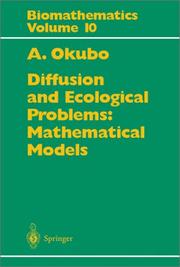
ISBN: 9780387096209 0387096205 3540096205 9780387096193 0387096191 Year: 1980 Publisher: New York: Springer,
Abstract | Keywords | Export | Availability | Bookmark
 Loading...
Loading...Choose an application
- Reference Manager
- EndNote
- RefWorks (Direct export to RefWorks)
The book provides a comprehensive, detailed and self-contained treatment of the fundamental mathematical properties of boundary-value problems related to the Navier-Stokes equations. These properties include existence, uniqueness and regularity of solutions in bounded as well as unbounded domains. Whenever the domain is unbounded, the asymptotic behavior of solutions is also investigated. This book is the new edition of the original two volume book, under the same title, published in 1994. In this new edition, the two volumes have merged into one and two more chapters on steady generalized oseen flow in exterior domains and steady Navier–Stokes flow in three-dimensional exterior domains have been added. Most of the proofs given in the previous edition were also updated. An introductory first chapter describes all relevant questions treated in the book and lists and motivates a number of significant and still open questions. It is written in an expository style so as to be accessible also to non-specialists. Each chapter is preceded by a substantial, preliminary discussion of the problems treated, along with their motivation and the strategy used to solve them. Also, each chapter ends with a section dedicated to alternative approaches and procedures, as well as historical notes. The book contains more than 400 stimulating exercises, at different levels of difficulty, that will help the junior researcher and the graduate student to gradually become accustomed with the subject. Finally, the book is endowed with a vast bibliography that includes more than 500 items. Each item brings a reference to the section of the book where it is cited. The book will be useful to researchers and graduate students in mathematics in particular mathematical fluid mechanics and differential equations. Review of First Edition, First Volume: “The emphasis of this book is on an introduction to the mathematical theory of the stationary Navier-Stokes equations. It is written in the style of a textbook and is essentially self-contained. The problems are presented clearly and in an accessible manner. Every chapter begins with a good introductory discussion of the problems considered, and ends with interesting notes on different approaches developed in the literature. Further, stimulating exercises are proposed. (Mathematical Reviews, 1995).
Partial differential equations --- Differential equations --- Mathematics --- Fluid mechanics --- differentiaalvergelijkingen --- toegepaste wiskunde --- ingenieurswetenschappen --- vloeistoffen --- Ecology - Mathematical models --- Diffusion - Mathematical models --- Biogeography - Mathematical models --- Biogeography --- Diffusion --- Ecology --- Mathematical models. --- 519.8 --- 51-76 --- 681.3*J3 --- 681.3*J3 Life and medical sciences (Computer applications) --- Life and medical sciences (Computer applications) --- 51-76 Mathematics--?-76 --- Mathematics--?-76 --- 519.8 Operational research --- Operational research --- Partial differential equations. --- Fluid mechanics. --- Applied mathematics. --- Engineering mathematics. --- Differential equations. --- Partial Differential Equations. --- Engineering Fluid Dynamics. --- Applications of Mathematics. --- Ordinary Differential Equations. --- Navier-Stokes equations. --- Lebesgue integral. --- Boundary value problems.
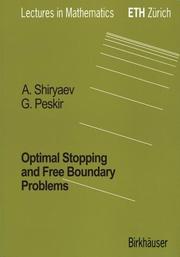
ISBN: 1281115185 9786611115180 3764373903 9783764324193 3764324198 9783764373900 Year: 2006 Publisher: Basel ; Boston : Birkhauser Verlag,
Abstract | Keywords | Export | Availability | Bookmark
 Loading...
Loading...Choose an application
- Reference Manager
- EndNote
- RefWorks (Direct export to RefWorks)
The present monograph, based mainly on studies of the authors and their - authors, and also on lectures given by the authors in the past few years, has the following particular aims: To present basic results (with proofs) of optimal stopping theory in both discrete and continuous time using both martingale and Mar- vian approaches; To select a seriesof concrete problems ofgeneral interest from the t- ory of probability, mathematical statistics, and mathematical ?nance that can be reformulated as problems of optimal stopping of stochastic processes and solved by reduction to free-boundary problems of real analysis (Stefan problems). The table of contents found below gives a clearer idea of the material included in the monograph. Credits and historical comments are given at the end of each chapter or section. The bibliography contains a material for further reading. Acknowledgements.TheauthorsthankL.E.Dubins,S.E.Graversen,J.L.Ped- sen and L. A. Shepp for useful discussions. The authors are grateful to T. B. To- zovafortheexcellenteditorialworkonthemonograph.Financialsupportandh- pitality from ETH, Zur ¨ ich (Switzerland), MaPhySto (Denmark), MIMS (Man- ester) and Thiele Centre (Aarhus) are gratefully acknowledged. The authors are also grateful to INTAS and RFBR for the support provided under their grants. The grant NSh-1758.2003.1 is gratefully acknowledged. Large portions of the text were presented in the “School and Symposium on Optimal Stopping with App- cations” that was held in Manchester, England from 17th to 27th January 2006.
Optimal stopping (Mathematical statistics) --- Boundary value problems. --- Nonlinear integral equations. --- Economics, Mathematical. --- Economics --- Mathematical economics --- Econometrics --- Mathematics --- Methodology --- Integral equations, Nonlinear --- Integral equations --- Nonlinear theories --- Boundary conditions (Differential equations) --- Differential equations --- Functions of complex variables --- Mathematical physics --- Initial value problems --- Stopping, Optimal (Mathematical statistics) --- Sequential analysis --- Optimal stopping (Mathematical statistics). --- Boundary value problems --- Nonlinear integral equations --- Economics, Mathematical --- Arrêt optimal (Statistique mathématique) --- Problèmes aux limites --- Equations intégrales non linéaires --- Mathématiques économiques --- EPUB-LIV-FT SPRINGER-B LIVMATHE --- Distribution (Probability theory. --- Mathematical optimization. --- Differential equations, partial. --- Finance. --- Probability Theory and Stochastic Processes. --- Calculus of Variations and Optimal Control; Optimization. --- Partial Differential Equations. --- Quantitative Finance. --- Funding --- Funds --- Currency question --- Partial differential equations --- Optimization (Mathematics) --- Optimization techniques --- Optimization theory --- Systems optimization --- Mathematical analysis --- Maxima and minima --- Operations research --- Simulation methods --- System analysis --- Distribution functions --- Frequency distribution --- Characteristic functions --- Probabilities --- Probabilities. --- Calculus of variations. --- Partial differential equations. --- Economics, Mathematical . --- Isoperimetrical problems --- Variations, Calculus of --- Probability --- Statistical inference --- Combinations --- Chance --- Least squares --- Mathematical statistics --- Risk

ISBN: 3540344675 9783540344674 3540344667 3642070825 Year: 2008 Publisher: Berlin : Springer,
Abstract | Keywords | Export | Availability | Bookmark
 Loading...
Loading...Choose an application
- Reference Manager
- EndNote
- RefWorks (Direct export to RefWorks)
This considerably extended and completely revised second edition incorporates many new developments in the thriving field of numerical methods for singularly perturbed differential equations. It provides a thorough foundation for the numerical analysis and solution of these problems, which model many physical phenomena whose solutions exhibit layers. The book focuses on linear convection-diffusion equations and on nonlinear flow problems that appear in computational fluid dynamics. It offers a comprehensive overview of suitable numerical methods while emphasizing those with realistic error estimates. The book should be useful for scientists requiring effective numerical methods for singularly perturbed differential equations.
Differential equations --- Singular perturbations (Mathematics) --- Numerical solutions. --- Perturbation (Mathematics) --- 517.91 Differential equations --- Asymptotic theory --- Springer eBooks. --- Boundary value problems. --- Finite element method. --- Navier-Stokes equations. --- Numerical analysis. --- Singular perturbations (Mathematics). --- Équations différentielles --- Perturbations singulières (Mathématiques). --- Solutions numériques. --- Engineering mathematics. --- Global analysis (Mathematics). --- Statistics. --- Chemistry. --- Numerical Analysis. --- Mathematical and Computational Engineering. --- Analysis. --- Mathematical and Computational Biology. --- Statistics for Life Sciences, Medicine, Health Sciences. --- Theoretical and Computational Chemistry. --- Physical sciences --- Statistical analysis --- Statistical data --- Statistical methods --- Statistical science --- Mathematics --- Econometrics --- Analysis, Global (Mathematics) --- Differential topology --- Functions of complex variables --- Geometry, Algebraic --- Engineering --- Engineering analysis --- Mathematical analysis --- Applied mathematics. --- Mathematical analysis. --- Analysis (Mathematics). --- Biomathematics. --- Statistics . --- Chemistry, Physical and theoretical. --- Chemistry, Theoretical --- Physical chemistry --- Theoretical chemistry --- Chemistry --- Biology --- 517.1 Mathematical analysis
| Listing 1 - 10 of 11 | << page >> |
Sort by
|

 Search
Search Feedback
Feedback About UniCat
About UniCat  Help
Help News
News